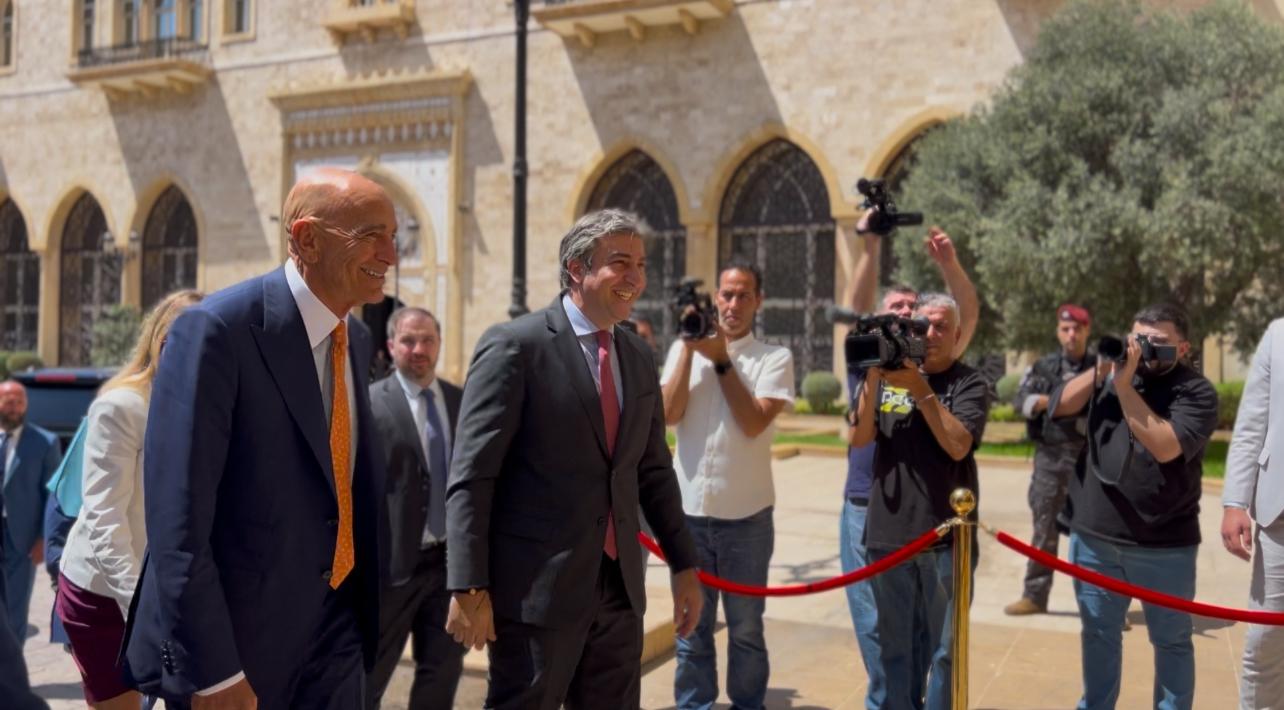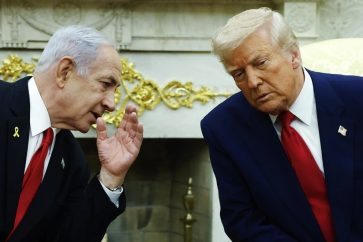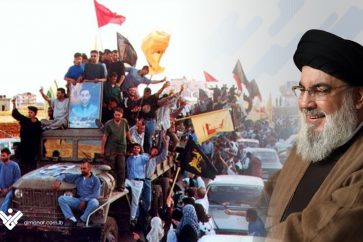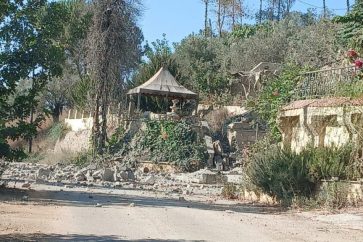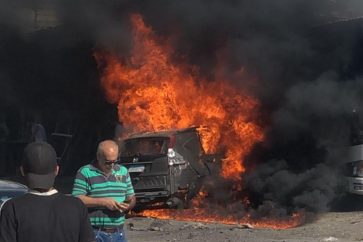The (futile) question of disarming the resistance in Lebanon returns to the mainstream with the visit of the new US envoy to Lebanon: US Ambassador to Turkey, Thomas Barrack. It appears the Trump administration has come to terms with the fact that its insolent approach—and its Zionist proxy war against the armed backbone of the resistance—has failed. This failure was personified by the incompetent Morgan Ortagus, the David-star-studded pageant queen with a penchant for improper diplomatic etiquette. Now, Tom Barrack, 78 years old and of Lebanese descent—specifically from the town of Zahle—has assumed her mantle.
On Monday, 7 July, Barrack and US Ambassador Lisa Johnson arrived at the Grand Serail for a meeting with Lebanese President Joseph Aoun and Prime Minister Nawaf Salam. Overhead, the skies above the Serail buzzed ominously as Israeli drones breached Lebanese airspace, terrorizing Beirut’s people—while, on the ground, US dignitaries were ushered inside with open arms.
The US party arrives at the Grand Serail to the backdrop of an Israeli surveillance drone (video filmed by Lebanon-based photographer Courtney Bonneau)
US Hospitality
During Barrack’s visit, war photographer Courtney Bonneau—whose video was featured above—said she was physically assaulted by an unidentified individual within the US envoy’s circle. Bonneau had attempted to ask Barrack for a statement on the daily Israeli violations, which have now neared 4,000. Before she could utter more than a question, she was “grabbed by the stomach and pinched very hard,” she told Al-Manar. The unknown man reportedly barked, “No questions!” before disengaging and walking away.
Bonneau, a veteran photojournalist affiliated with Getty Images and Middle East Images, has long documented the diverse cultures of the region, with a recent focus on South Lebanon’s proud resistance community. Since Israeli brutal war on Lebanon last year, she has remained on the ground, chronicling both the offensive and the ongoing ceasefire violations committed daily by the enemy.

“But I want to emphasize that I’m not the story here,” she said. “The daily ceasefire violations are. The daily murder and bombings that we endure—that’s the story. You can’t just murder someone because they’re a member of Hezbollah. It’s a clear violation of international law.”
In response to Bonneau’s account, the Serail’s media office quickly issued a denial, naming the Grand Serial staffer as Mahmoud Fawaz and claiming he had merely spoken to her calmly, advising that no questions were allowed. Fawaz later gave a statement to Al-Nahar News, insisting the incident was entirely verbal. Notably, Bonneau never named or described her assailant to the press.
على إثر الخبر المتداول على وسائل التواصل الاجتماعي حول منع إحدى الصحافيات من طرح سؤال على الموفد الأميركي خلال زيارته للسراي الحكومة، وادعاءها بأن أحد اعضاء المكتب الاعلامي في السراي قد تعرض لها.
يهم المكتب الإعلامي في السراي الحكومي التأكيد أن ما جرى، هو أن الصحافية المذكورة…
— رئاسة مجلس الوزراء 🇱🇧 (@grandserail) July 8, 2025
A Roadmap to Submission

On 19 June, Barrack presented to the Lebanese government a so-called roadmap for “arms exclusivity”—in other words, disarmament of the resistance—as a precondition for US-backed economic reforms. A statement from the Lebanese presidency noted that discussions between President Aoun and Barrack centered on “steps to implement the principle of arms exclusivity.” According to a Lebanese official who spoke on condition of anonymity, Barrack’s five-page proposal consisted of three main points.
The first called for the collection of all weapons and their placement under state control. The second focused on financial and economic reform, tightening border controls, preventing smuggling, and improving procedures at border crossings. The final component urged the repair of Lebanese-Syrian relations across political and security dimensions, including border demarcation and enhanced trade and economic cooperation. The official emphasized that Beirut remains committed to the principle of state authority over all arms.
While the proposal may not have explicitly conditioned all reforms on disarmament, its placement as the first and most prominent item makes the US intention clear: Lebanon will not see a path to economic recovery unless it agrees to dismantle the one force that still defends its sovereignty—a resistance movement whose legitimacy is enshrined in international law.
As for Barrack’s diplomatic style, some have noted he does not appear, at least on the surface, to be a rabid Israel-first foreign policy hawk like Ortagus, nor a former Israeli Occupation Forces (IOF) officer like Amos Hochstein. It seems, for once, the US administration is capable of appearing civil. But civility, in this case, is only a costume for coercion.
Sending Zionist-aligned officials to handle the Lebanon file is no coincidence—it is a calculated act of narrative engineering. The sight of such figures strolling into Lebanese government halls is meant to overwrite the enduring image of tanks crushing villages, of occupation troops brutalizing the south, of civilians disappeared into prison camps for whispering words of resistance. But the US can’t rewrite history with optics when, a year into a supposed ceasefire, the skies of South Lebanon are still filled with drones and death.
The “Foreign Agent”

Although Barrack seems like a refreshing change to his Zionist predecessors, it is necessary to investigate his political and business background to put into context who we’re really dealing with. Information is publicly available about Barrack’s career and history, and whenever dealing with any kind of US official, there is always one form of corruption or other to uncover, whether they be Zionist-Israelis or of Lebanese descent.
Thomas Joseph “Tom” Barrack Jr., the 78‑year‑old American‑Lebanese from Zahle, boasts a reputation as a billionaire trader, Trump loyalist, and self-styled Middle East gatekeeper. Raised in Los Angeles to Lebanese-Christian immigrants, he built his fortune from real estate with Colony Capital (now DigitalBridge), managing tens of billions and presiding over assets from hotels to distressed debt in the Gulf
Barrack’s rise on the international stage was tied to his friendship with Donald Trump. He served as Trump’s informal advisor during the 2016 campaign, chaired the Inaugural Committee, and raised over $100 million for the ceremony). Word is, he whispered to Trump the idea of hiring Paul Manafort—whom he’d met in Beirut decades earlier—to run the campaign.
In July 2021, Barrack was indicted alongside aide Matthew Grimes and Emirati middleman Rashid Al Malik, accused of acting as unregistered agents of the UAE. Prosecutors claimed he inserted pro‑UAE language into campaign speeches, used back‑channels, and took talking points from UAE leaders to shape Trump’s foreign policy. He faced charges of violating Section 951, obstruction of justice, and lying to the FBI during a 2019 interview. Critics dubbed it “espionage lite,” alleging he ran secret influence campaigns while pocketing Gulf funding.
But on November 4, 2022, a Brooklyn jury delivered a dramatic acquittal: Barrack was found not guilty on all counts—foreign agent, obstruction, false statements—breaking DOJ’s streak of FARA prosecutions, the whole nine yards. The courtroom erupted in tearful celebration; Barrack praised the US legal system as “amazing,” even as prosecutors lamented the shadow campaign he allegedly ran.
Fast‑forward to May 2025: Trump, undeterred, nominated Barrack as US Ambassador to Turkey and Special Envoy for Syria, despite his controversial past. The Senate confirmed him 60–36, and he presented credentials to President Recep Tayyip Erdoğan on May 14, 2025. Yet, whispers persist: Can Beirut trust a man once accused of clandestine influence-peddling on behalf of Gulf monarchies? For a diplomat tasked with tempering regional tensions, his track record casts a long, suspect shadow.
A Familiar Face in an Old Playbook
Tom Barrack’s arrival in Lebanon marks not a shift in US foreign policy but a recycling of its most cynical tendencies—wrapped this time in the soft gloves of Lebanese ancestry and diplomatic pleasantries. Despite his Zahle roots and courtroom acquittals, Barrack remains emblematic of a broader machinery: a system that rewards influence-peddling, whitewashes foreign interference when it suits imperial agendas, and cloaks coercive demands in the language of reform. His proposal, packaged as an economic lifeline, is a veiled ultimatum: disarm, or stay in ruins.
This is not diplomacy; it is submission through staged civility. Lebanon is once again being strong-armed—this time not with boots on the ground, but with suits in boardrooms and whispers in ministries. From the tarmac of the Grand Serail to the silence that followed Bonneau’s assault, every gesture of this visit underscores the grotesque normalcy of occupation-era power dynamics, now made palatable by those fluent in the language of both Wall Street and Wadi Abu Jamil.
Barrack’s alleged backroom dealings with Gulf monarchies and his role in laundering their political will through Trumpian corridors of power only deepen the skepticism. His clean legal record might win him handshakes in Ankara and photo-ops in Beirut, but in the resistance belt of South Lebanon, his name joins the long roster of foreigners who came bearing promises and left carrying dossiers of failed manipulations.
As Zionist drones trace circles over the heads of civilians and US “partners” press for the dismantling of their only viable defense, the people of Lebanon are reminded, yet again, that sovereignty is not gifted—it is defended. And resistance, no matter how demonized, remains the final line between independence and subjugation. The envoy may change, the pressure may evolve, but the answer remains: Lebanon will not be disarmed at the barrel of a bailout.
Source: Al-Manar English Website

